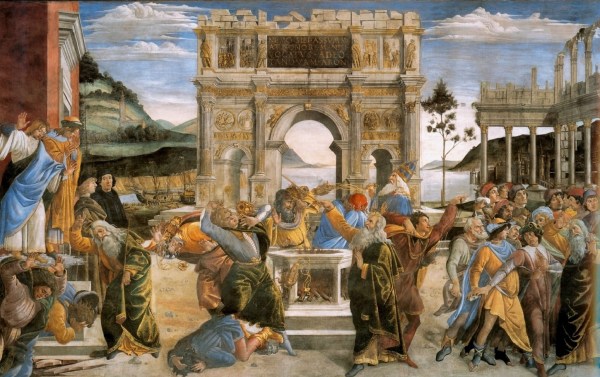
Rebel is a polarized term today. It’s either looked down upon, or revered. Twentieth century Hippies, Punks, and Greasers are styles of clothing and ideology still worn with as much purpose as the day they evolved from the social norm, and identified positively or negatively as such. However, rebellion is open and shut for Christians. We see strong language in the Bible to describe it, and it isn’t about counter culture stylings. Rebellion in the Bible is usually firstly identified with the story of Satan falling from heaven. This could leave the subject a bit ambiguous if it were not for a few clear passages on it. Samuel said rebellion was as bad as witchcraft, and Solomon said evil people seek it. The book of Joshua lists it alongside treachery to God.
Another event worth looking into is referred to as Korah’s Rebellion, which is recorded in the book of Numbers. The third chapter of Hebrews refers to it simply as “the rebellion,” and describes the participants as evil, disobedient, and hardhearted. As a result, and used here as a lesson for all Christians, God swore the rebels “would not enter His rest.”
So What Happened?
Numbers 16 records Korah leading an uprising against Moses, accusing him of exalting himself above the rest of the people, and arrogantly accusing Moses, as well as God, for misleading them from Egypt to the Promised Land. What follows is an account of an earth quake that follows the leaders of the rebellion, as well as a plaque that wipes out over fourteen thousand people, before Moses can intervene and save the rest. This account is one of many from the Old Testament that shows the punishment for God’s people disobeying Him.

Veneration of Rebellion
Phil Johnson recently delivered a message noting our “veneration of rebellion,” but also made sure to separate it from another term, reformation. It’s right to specify that reform is to abandon and improve an evil way, while a rebel merely opposes the current institution. This distinction is key for us as we evaluate our actions, from interpreting Romans 13 to observing democidal “governing authorities.” Reformers are usually recognized by their use of the pen and other nonviolent forms of standing against injustice or perversions of truth, but what about our God given resolve to stand against murderers and tyrants?

A Revolution
This introduces a bit of a grey area, the revolution. The title of revolution is generally applied to an event after the rebels have been successful. In the event that they are unsuccessful, or from the perspective of the defense, the event is a mutiny, insurrection, or rebellion. This is where emotion usually drives the narrative as we discuss the past. The moments of the most veneration that still consumes our discussions today, is the American Revolution and the American Civil War. Taking a moment to examine these events from the different perspectives we’ve already listed can lead to some consideration that is usually absent from conversations where we ardently support one side. As Dylan rightly pointed out, in so many instances, both sides believe God is on their side.
Furthermore, this consideration might lead us to put aside the perspectives we grew up with, and see that a violation of our interpretation of Romans 13 is only applied to the loser, or active opponents to our side. Why is it that we would call for the strictest of punishments for tax evaders and cop killers today, yet hold the participants of the American revolution in such high regard?

Critical Consistency
There is something about these events that shuts off any critical thinking about the American Revolution. The enormous amount of emotions wrapped up in state sanctioned observances, and hallowed icons thereof, can be argued from either an orchestrated position or an innate human nature to build an idol. Both have their merit, and most people of a “conservative” bend will gladly point out that indoctrination and propaganda exists, and works, until you point to their preferred brand specifically. In the case of Romans 13, we’re ready to apply “the institution by God” to leaders we want in office, but the opposition party representative is the Antichrist. Likewise, we quickly associate our team with this divine appointment, but fail to see that if all governing authorities are divinely appointed, that would include those historically known for genocide.
This is where the consistency is important, but not regularly employed. The important takeaway from considering an epic turn of events with The American Revolution isn’t that we would “still be under the crown.” The more important conclusion is that we could be learning of this period between 1765 and 1783 as The Colonial Insurgency, when ungrateful gorilla terrorists refused to be “subject to the governing authorities,” whose existence has “been instituted by God.”
Whiskered Men With Bombs
No doubt, this is the popular opinion regarding the word anarchist. “Anarchists” are commonly viewed today as wearing bandannas and black hoodies, but not much different from Tolkien’s observances in the 1940’s of “whiskered men with bombs.” The thing we should consider; bandannas, whiskers, or continental hats, what is the Christian position on rebellion and how do we consistently apply it? For the Christian anarchist specifically, we know we’re already in a position to be set against the governing authorities, but are we applying our faith in Christ and our facts of coercive governance consistently? As irksome as the statist interpretation of Romans 13 is, we must consider our instructions of behavior with friend and foe, consider our fruit, and consider if we are reforming or rebelling.

____________________________


 Find it on
Find it on 
